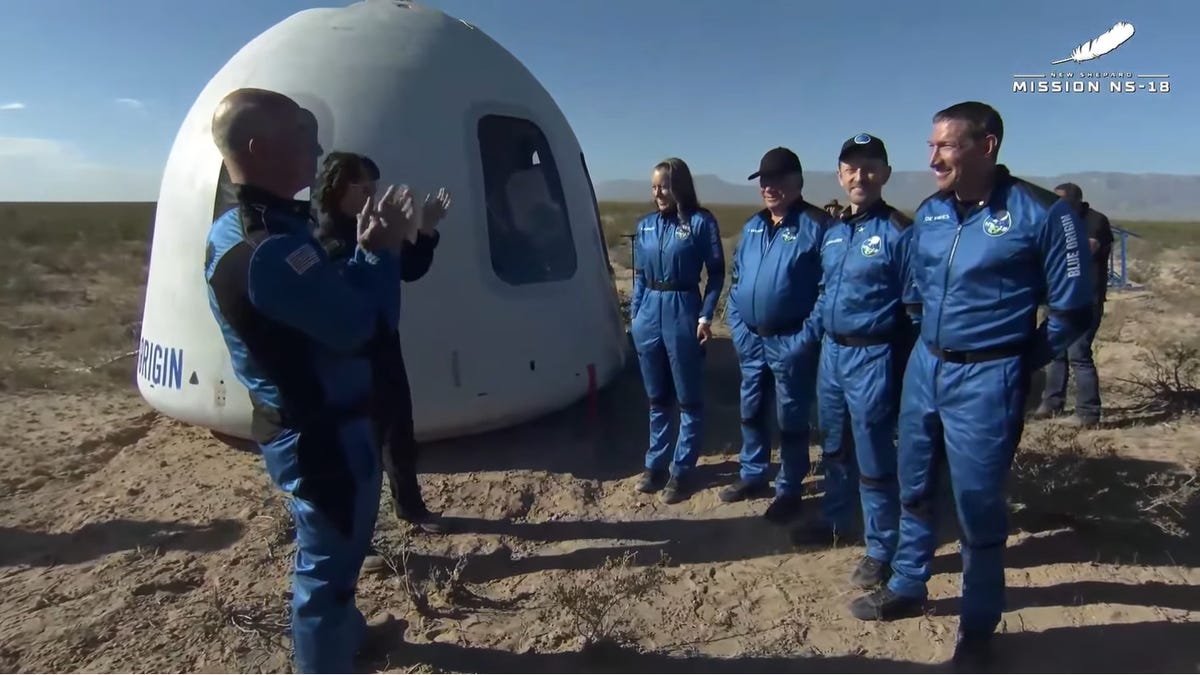William Shatner rockets to space and back with Blue Origin
"I hope I never recover from this," he says afterward.

Blue Origin and Amazon founder Jeff Bezos (left) welcomes back the crew, including William Shatner (third from right).
William Shatner, the alter ego of one of the most iconic space travelers ever, has completed his first real trip to space.
The iconic 90-year-old actor best known for playing James T. Kirk, captain of the Starship Enterprise in the Star Trek universe, blasted off atop a Blue Origin New Shepard rocket from the company's west Texas launch site at 7:50 a.m. PT (9:50 a.m. local time) on Wednesday.
Shatner was joined in the New Shepard capsule by Chris Boshuizen, former NASA engineer and co-founder of satellite imaging company Planet Labs; Glen de Vries, an entrepreneur and executive with French software company Dassault Systemes; and Audrey Powers, Blue Origin's vice president of mission and flight operations.
A few minutes into the flight, the capsule separated from the booster and continued on to suborbital space, where the crew experienced weightlessness and an epic view of Earth before reentering the atmosphere for a parachute-assisted soft landing in the desert. The whole experience lasted just over 10 minutes.
During the flight, Shatner's Twitter account posted a quote from Isaac Newton:
I do not know what I may appear to the world, but to myself I seem to have been only like a boy playing on the seashore, diverting myself in now & then finding a smoother pebble or a prettier shell than ordinary, whilst the great ocean of truth lay all undiscovered before me.🚀 pic.twitter.com/ZY2Ka8ij7z
— William Shatner (@WilliamShatner) October 13, 2021
During the last minutes of the descent, Shatner could be heard exclaiming, "That was unlike anything they described... that's unlike everything you'll ever see or ever feel again."
The crew was greeted by Blue Origin founder Jeff Bezos as they exited the crew capsule on the valley floor of the Texas desert. Shatner choked up as he thanked the billionaire entrepreneur.
"What you have given me is the most profound experience... I'm so filled with emotion about what just happened. It's extraordinary. I hope I never recover from this," he said.
Shatner steps back to Earth.
After separation early in the flight, the New Shepard booster returned for an autonomous landing on the ground to be reused in the future.
This is the second crewed flight ever for the space tourism company. The first flight of a New Shepard rocket with humans aboard launched July 20 and carried company founder and mega-rich guy Bezos, his brother Mark, aviation pioneer Wally Funk and student Oliver Daemen on a quick trip to space.
Shatner now takes the title of oldest person ever in space from the 82-year-old Funk, who held the crown for under three months.
The mission, dubbed NS18, was streamed live.
Shatner, who has also released over 10 albums as a recording artist, says he plans to write a song about the experience for his next album.
"I want to write about my love of Earth," Shatner said in an interview posted to Twitter.
The launch was originally scheduled for Oct. 12 but got bumped to the following day because of winds in the forecast. Liftoff was also delayed Wednesday morning by over 30 minutes, but New Shepard was finally able to get off the ground.

